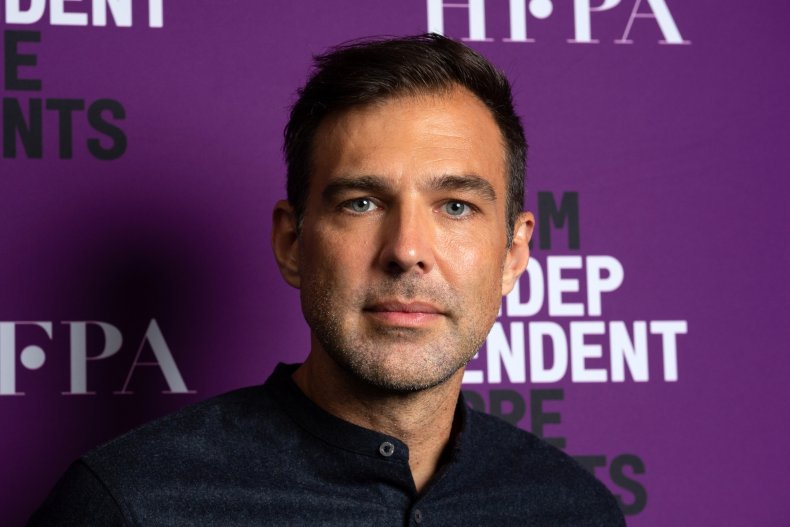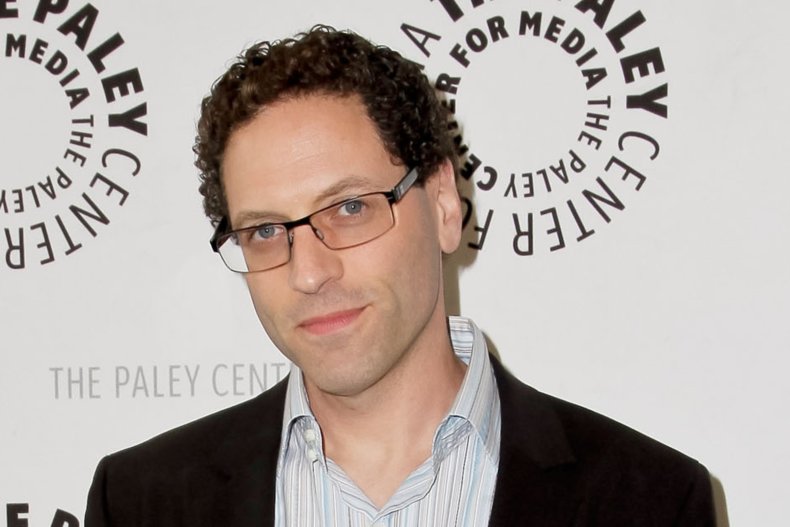- The Writers Guild of America is several days into a strike, including over pay and the threat of AI.
- Screenwriters have told Newsweek that they are struggling to make ends meet—with one forced to steal food from the Netflix cafeteria.
- Their plight raises fears for the future of the profession and some of America's favorite shows.
Life as a Hollywood writer promises Champagne and caviar. For Michael Mohan, it didn't even provide enough for a sandwich.
Three weeks before the ongoing writers' strike began, Mohan, the co-creator of Netflix show Everything Sucks!, sought to illustrate the plight of working in the industry with a tweet that could easily serve as the plot of an outlandish drama.
"Yo, no joke," he wrote on the night of April 11, "when we were writing Everything Sucks, Ben [Young Jones] and I used to steal food from the Netflix cafeteria to feed our families [because] we had to write for many months for free and couldn't take other jobs."
Mohan's tweet has been viewed hundreds of thousands of times. Amid the surprise—and a predictable joke that his situation "sucks"—were expressions of solidarity. The writers' strike has surfaced familiar concerns about low wages and the power of big corporations, and less familiar ones, such as the threat AI may pose to creative industries.
While some Americans will doubtless have little sympathy for Hollywood writers in a country facing soaring prices, Mohan says they should be concerned—not least because what he sees as an existential crisis risks killing off the shows they love to watch.
Mohan told Newsweek that while he deems himself "incredibly fortunate" to be living out his dream, it's become increasingly unstable for countless people working behind the scenes.
"No one should move to Hollywood thinking that a lucrative career in the arts is a sure bet," he said. "But I think that once you get to a certain level... I sort of always assumed that if you were making a living writing and directing movies and TV that there would be a little bit more stability once you reach a certain level. And that's not at all true."

'A Chaotic System'
In a series of follow-up tweets to his first, Mohan, who also served as a director and executive producer on Everything Sucks!, explained the pay structure that the Writers Guild of America (WGA)—the union representing thousands of TV and film writers—is striking against.
While those "lucky enough" to sell a show are paid a reasonable fee for a pilot script and, possibly, a detailed summary of the series, the package tightens considerably from that point on. Should a series be greenlit, a team of writers is assembled to pull the script together, earning both a weekly fee and script fee. In the case of Everything Sucks!, this lasted four weeks.
Serving as co-executive producer on the show meant that, in addition to his other responsibilities, he was tasked with extensive rewrites. However, payment for these duties didn't arrive until production kicked off. Four months before production began, the "money allocated for writing had long been spent."
The injections of cash early on in the process had to tide Mohan over for 18 months, until eventually he was leaving the studio each day with a satchel laden with to-go boxes of food. The scenario, Mohan said, laid bare a "chaotic system, where the pay and pay structure don't match up to the work being done and the demands it puts [on] your life."
Pay and the Threat of AI: Why Writers Are Striking
While Mohan's experiences may sound extreme, he said they are far from unusual, hence the writers' strike.
The WGA on May 1 said that it was due to go on strike after six weeks of talks with Netflix, Amazon, Apple, Disney, Warner Brothers, NBC Universal, Sony and Paramount—all under the umbrella of the Alliance of Motion Picture and Television Producers (AMPTP)—broke down. Picket lines assembled the following day.
Writers and the AMPTP locked horns over contractual terms, including pay. The studios' refusal to rule out artificial intelligence one day replacing human staffers escalated the tension.
There have also been issues with writers' compensation not matching up with the billions of streams that shows and films now often draw. Mohan wants greater transparency, citing the example of a film he directed for Amazon called The Voyeurs.
"I have no idea how many people saw the movie. I think it was a hit. But I'll never know," he said.
"My agents can't point to it, to help me negotiate for a better rate with my subsequent projects," he added. "Because it's not like the box office where you can go, 'Oh, his last movie grossed $100 million. He clearly is in touch with what the public wants, and therefore, you should compensate him.' I don't have that data. Who knows how many streams it had... I don't even know if the film was profitable."

As a result, Mohan said, "none of us have any idea how our residuals are calculated. So every once in a while I'll get a check in the mail. Like, for Everything Sucks!, for a little while, we were getting a check for $1,400, once or twice a year. And then suddenly, it just stopped. We don't get residuals anymore, even though the show's still on their platform. So it would be just really nice for us to understand how that's actually figured out."
When contacted by Newsweek, a spokesperson for Netflix stated that Everything Sucks!, which debuted in 2018, falls under an outdated 2014 contract, with all payments having been made pursuant to that WGA agreement. Citing the WGA's data, the representative added that residuals recently reached an all-time high for writers—with almost 45 percent coming from streaming services—since the agreement was updated in 2020. The representative added that Netflix pays out residuals as long as titles remain on its service, irrespective of the project's success.
Newsweek has reached out to representatives of Amazon Studios via email for comment.
Jason Gordon, director of communications for WGA East, told Newsweek as the strike began that fairness is an important component in maintaining sustainable careers.
"This strike is about ensuring that writers get the dignity, respect, and value they deserve, and that these are reflected in a fair contract with the studios and networks that employ them," Gordon said via email. "That is what is at stake in this strike—whether writers can sustain careers creating series and films that the American people love and enjoy."
As a result of the strike, TV shows that rely on writers to create content on the day of airing, such as late-night talk shows, were forced off the air. Prerecorded and scripted shows shot before the strike have continued as normal.
However, in the days since the writers walked out, studios have already pushed pause on development of highly anticipated content, including Netflix's Stranger Things, Disney and Marvel's Blade, AppleTV+'s Severance and Paramount's Evil.
Dwindling Fortunes
TV writer and producer Michael Jamin—whose credits include King of the Hill, Beavis & Butthead, Wilfred, Just Shoot Me, and Rules of Engagement—recently broke down the reasons for the strike in a viral TikTok post. He also highlighted the importance of writers.
"At the end of the day, writing—television, writing and screenwriting—cannot be a gig economy," said Jamin, who uses his TikTok account to share industry tips. "You want career writers, because the shows, movies cost a lot of money and you want to have people who do this for a living."
Jamin told Newsweek that over the course of his decades-long career in the industry, he has seen the fortunes of writers dwindle dramatically.

"When I broke in many years ago, making a living at it was conceivable," he said. "It was a dream, but you could make it a reality. Back then, if you were working on a successful network television show, you would do maybe 22, or even 24 episodes a season, and most TV writers get paid per episode produced.
"So if you're doing 24 episodes a season, that's a great year. You have two months for hiatus, you go back to work, and everything's great. But today, because of streaming, the studios have figured out ways to hire you for fewer weeks. So now, if you're on a hit show, you might only do eight episodes a season. And then making it worse, the studio has figured out ways to actually not hire the writer for the bulk of the production—they only hire you for pre-production. So now, if you're on a hit show, you might only work three months out of the year."
He said that the average writer's salary has gone down by 4 percent, "and over that same amount of time, the studio's profit has gone up by 39 percent. This is what they post publicly for their shareholders... It's OK that they have switched their business model to streaming. It's their business, they can do what they want, but they haven't changed the way writers get compensated for this."
Jamin entered the business when writers were paid residuals on the sales of VHS cassettes. "And then things started moving to DVDs. And the studios said, 'No, we're gonna pay you much less than you would on on cassettes, because this is new technology, we don't know if we're gonna make any money from it,' he said. "Even though the technology was vastly superior, the manufacturing costs were less... and the shipping costs were much less.
"But the writers had to accept a much lower residual rate on that. And then when things move from DVDs to streaming, even lower on that... Every step of the way, it's a fight. Every time there's new technology, we kind of have to go go on strike or fight for it or as we're continuing to be cut out of the profits."
Misconceptions of Glamor
With the fruits of their labor being streamed and broadcast internationally, you might be forgiven for thinking that top writers lead lives akin to the A-listers who star in their projects.
For Mohan, who as a director is currently in post-production on the upcoming horror film Immaculate, this couldn't be further from the truth.
"It's embarrassing to say, but I had a show on Netflix for a season, I wrote and directed a film for Amazon Studios, and I am nowhere near being able to afford to buy a house," he said.

Jamin said that "no one becomes a screenwriter because they're chasing money. Most of us start off as starving artists. We're not chasing the money, we're chasing the freedom and the creativity and we're willing to trade are willing to trade security, for that freedom. You hear things like, 'greedy corporate CEOs,' but you don't hear, 'greedy artists.'"
"We're asking, can we just make enough that we can continue doing this?" Jamin added. "Because the average writer does not have a house in Malibu overlooking the ocean. Most of us are very middle class."
Despite Jamin's success and relative seniority in the business, he admitted that he and his peers are on a constant cycle of seeking employment once a project concludes.
"People assume that just because I've been in the business so long, it must be easy for me," Jamin said. "But [after a job is finished] it's like, how am I gonna get another one?"
Sink or Swim
The last WGA strike started in 2007 and bled into 2008, lasting 100 days in total and forcing dozens of shows off the air. It cost the entertainment industry $2.1 billion, resulting in the loss of 37,700 jobs, the Milken Institute think tank estimated.
Jamin said that if the studies were willing to budge even slightly, such a scenario could be avoided.
"What's funny is that the studios don't even have to give the writers everything that we want, all they have to do is give 51 percent of the writers enough to make them hold their nose and say, 'Fine, it's good enough,'" he said.
"And the other 49 can be furious about it, and a deal will be made. That's the dirty little secret that both sides know, that the studios don't have to give us everything, they just have to give us enough. And they're not even anywhere close to that right now."
Still, Jamin believes that the increasingly louder voices of workers in Hollywood who are not writers could well bring about unprecedented change in what he sees as a sink-or-swim moment for the industry.
"The energy is a little different [from the last strike] this time around," he said. "Many of the other guilds feel the same way, that this is really more of an existential threat. And that if we don't win this, we're really signing our own death warrants in terms of being able to be writers anymore. We won't be able to afford to do it. We'll be forced to find other occupations.
"To be honest, it really is in the studios' best interest to maintain a healthy talent pool of writers, because you want experienced writers doing these shows. These shows, the budgets are huge. A low budget show might be a million dollars in episode. So they don't want to hire inexperienced writers, they're not going to trust them with that kind of budget, they want an experienced talent pool. They just don't want to pay for it."
Mohan believes that if the studios come out on top, it threatens to gravely affect not only career opportunities but also the entertainment that the everyday person consumes.
"There is a blue collar creative class, and that blue collar creative class is going to go away if things keep keep things keep going the way they are," he said. "And it will severely limit the types of stories that we see on TV."








